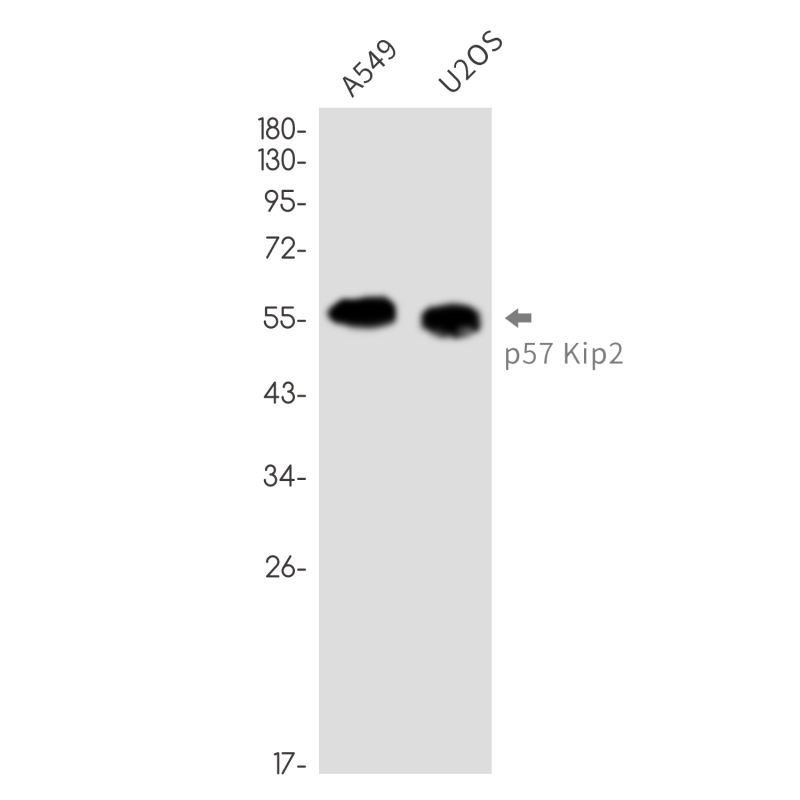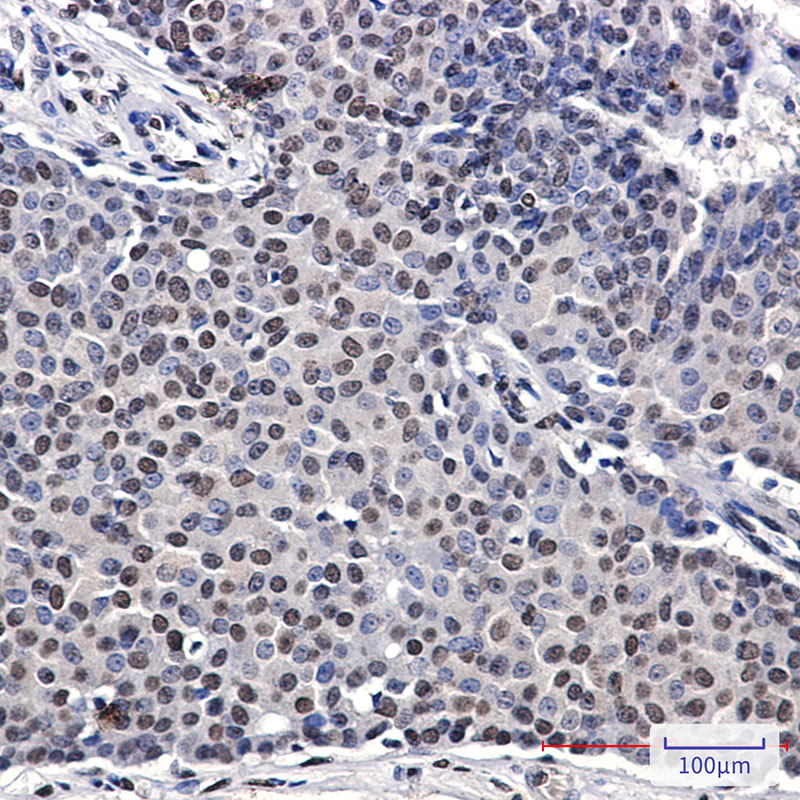

| WB | 1/500-1/1000 | Human,Mouse,Rat |
| IF | 1/20 | Human,Mouse,Rat |
| IHC | 1/50-1/100 | Human,Mouse,Rat |
| ICC | 技术咨询 | Human,Mouse,Rat |
| FCM | 咨询技术 | Human,Mouse,Rat |
| Elisa | 咨询技术 | Human,Mouse,Rat |
| Aliases | CDKN1C; KIP2; Cyclin-dependent kinase inhibitor 1C; Cyclin-dependent kinase inhibitor p57; p57Kip2 |
| Entrez GeneID | 1028 |
| WB Predicted band size | Calculated MW: 32 kDa; Observed MW: 57 kDa |
| Host/Isotype | Rabbit IgG |
| Antibody Type | Primary antibody |
| Storage | Store at 4°C short term. Aliquot and store at -20°C long term. Avoid freeze/thaw cycles. |
| Species Reactivity | Human |
| Immunogen | A synthetic peptide of human p57 Kip2 |
| Formulation | Purified antibody in TBS with 0.05% sodium azide,0.05%BSA and 50% glycerol. |
+ +
以下是3篇关于p57 Kip2抗体的代表性文献及其摘要概括:
---
1. **文献名称**:*"p57Kip2 immunohistochemistry in the diagnosis of complete hydatidiform mole"*
**作者**:Romero R. et al.
**摘要**:该研究利用p57 Kip2抗体进行免疫组化分析,发现完全性葡萄胎(无母体DNA)中p57蛋白表达缺失,而部分性葡萄胎和正常胎盘保留表达,提出p57抗体可作为鉴别妊娠滋养细胞疾病的重要工具。
2. **文献名称**:*"Expression of p57Kip2 in Beckwith-Wiedemann syndrome patients"*
**作者**:Weksberg R. et al.
**摘要**:通过p57 Kip2抗体检测贝威二氏综合征(BWS)患者组织,发现CDKN1C基因突变或表观遗传异常导致p57蛋白表达显著降低,揭示了该基因在过度生长综合征中的调控作用。
3. **文献名称**:*"Cell cycle control by p57Kip2: Dysregulation in cancer"*
**作者**:Matsuoka S. et al.
**摘要**:研究使用p57 Kip2抗体进行Western blot和免疫荧光实验,证明p57通过抑制CDK复合物调控G1/S期转换,其表达下调与多种癌症进展及不良预后相关。
---
这些文献分别从疾病诊断、遗传综合征机制及癌症研究角度,展示了p57 Kip2抗体的应用场景和科学价值。如需具体文章信息,建议通过PubMed或Google Scholar按标题检索。
p57 Kip2. encoded by the *CDKN1C* gene, is a cyclin-dependent kinase (CDK) inhibitor belonging to the CIP/KIP family, alongside p21 and p27. It regulates cell cycle progression by binding to and inhibiting CDK-cyclin complexes, particularly during the G1 phase, thereby controlling cellular proliferation, differentiation, and apoptosis. Discovered in the mid-1990s, p57 Kip2 is notable for its role in embryonic development and tissue-specific regulation, partly due to its status as an imprinted gene expressed primarily from the maternal allele.
Antibodies targeting p57 Kip2 are widely used in research and diagnostics. In cancer biology, they help study its tumor-suppressive functions, as *CDKN1C* silencing via promoter methylation or loss of imprinting is linked to cancers like Beckwith-Wiedemann syndrome-associated tumors. In diagnostic pathology, p57 Kip2 immunohistochemistry aids in distinguishing complete hydatidiform moles (p57-negative due to paternal origin) from partial moles or non-molar abortions.
Commercially available p57 Kip2 antibodies (e.g., clones 25B2. DCS-72) are validated for techniques such as Western blot, immunofluorescence, and IHC. However, variability in antibody specificity and staining protocols requires careful optimization. Ongoing research explores p57 Kip2's interactions with signaling pathways (e.g., TGF-β, Hippo) and its potential as a therapeutic target, underscoring its multifaceted role in health and disease.
×